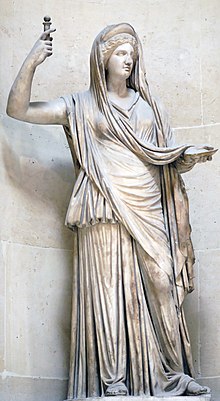Hera
Appearance
English
[edit]
Etymology
[edit]Borrowed from Latin Hēra, from Ancient Greek Ἥρᾱ (Hḗrā).
Pronunciation
[edit]Proper noun
[edit]Hera
- (Greek mythology) The queen of the gods, and goddess of marriage and birth; daughter of Cronus and Rhea, sister and wife of Zeus,[1] mother of Hephaestus, Ares, Hebe, and Enyo.
Translations
[edit]queen of the gods, wife of Zeus
|
See also
[edit]- Juno
- (Greek mythology Olympian gods) god; Apollo, Aphrodite, Ares, Artemis, Athena, Demeter, Dionysus, Hades, Hephaestus, Hera, Hestia, Hermes, Poseidon, Zeus
References
[edit]- ^ Oxford Dictionary of World Mythology, Arthur Cotterell, Oxford University Press, 1986
Further reading
[edit]Anagrams
[edit]Catalan
[edit]Etymology
[edit]Borrowed from Ancient Greek Ἥρα (Hḗra).
Pronunciation
[edit]Proper noun
[edit]Hera f
Further reading
[edit] Hera on the Catalan Wikipedia.Wikipedia ca
Hera on the Catalan Wikipedia.Wikipedia ca
Danish
[edit]Etymology
[edit]From Ancient Greek Ἥρα (Hḗra).
Pronunciation
[edit]Proper noun
[edit]Hera
Further reading
[edit] Hera on the Danish Wikipedia.Wikipedia da
Hera on the Danish Wikipedia.Wikipedia da
Faroese
[edit]Proper noun
[edit]Hera f
- a female given name
Usage notes
[edit]Matronymics
- son of Hera: Heruson
- daughter of Hera: Herudóttir
Declension
[edit]| singular | |
|---|---|
| indefinite | |
| nominative | Hera |
| accusative | Heru |
| dative | Heru |
| genitive | Heru |
Galician
[edit]Etymology
[edit]Borrowed from Ancient Greek Ἥρα (Hḗra).
Pronunciation
[edit]Proper noun
[edit]Hera f
German
[edit]Pronunciation
[edit]Audio: (file)
Proper noun
[edit]Hera f
Icelandic
[edit]Pronunciation
[edit]Proper noun
[edit]Hera f (proper noun, genitive singular Heru)
- (Greek mythology) Hera
- a female given name
Declension
[edit]Japanese
[edit]Romanization
[edit]Hera
Lithuanian
[edit]Etymology
[edit]Borrowed from Ancient Greek Ἥρα (Hḗra).
Pronunciation
[edit]Proper noun
[edit]Hera f
Declension
[edit] Declension of Hera
Maori
[edit]Etymology
[edit]Proper noun
[edit]Hera
- a female given name, equivalent to English Sarah
Related terms
[edit]Polish
[edit]Etymology
[edit]Learned borrowing from Latin Hēra.
Pronunciation
[edit]Proper noun
[edit]Hera f
Declension
[edit]Declension of Hera
Further reading
[edit]- Hera in Polish dictionaries at PWN
Portuguese
[edit]
Etymology
[edit]Learned borrowing from Ancient Greek Ἥρα (Hḗra).
Pronunciation
[edit]
- Rhymes: -ɛɾɐ
- Homophones: era, hera
- Hyphenation: He‧ra
Proper noun
[edit]Hera f
See also
[edit]Spanish
[edit]Etymology
[edit]Borrowed from Ancient Greek Ἥρα (Hḗra).
Pronunciation
[edit]Proper noun
[edit]Hera f
Swedish
[edit]Etymology
[edit]Ultimately from Ancient Greek Ἥρα (Hḗra).
Proper noun
[edit]Hera c (genitive Heras)
See also
[edit]- (Greek mythology Olympian gods) god; Apollo, Afrodite, Ares, Artemis, Athena, Demeter, Hefaistos, Hera, Hestia, Hermes, Poseidon, Zeus
Anagrams
[edit]Turkish
[edit]Proper noun
[edit]Hera
Categories:
- English terms borrowed from Latin
- English terms derived from Latin
- English terms derived from Ancient Greek
- English 2-syllable words
- English terms with IPA pronunciation
- Rhymes:English/ɪəɹə
- Rhymes:English/ɪəɹə/2 syllables
- Rhymes:English/ɪɹə
- Rhymes:English/ɪɹə/2 syllables
- English lemmas
- English proper nouns
- English uncountable nouns
- en:Greek deities
- Catalan terms borrowed from Ancient Greek
- Catalan terms derived from Ancient Greek
- Catalan terms with IPA pronunciation
- Catalan terms with homophones
- Catalan lemmas
- Catalan proper nouns
- Catalan feminine nouns
- ca:Greek deities
- Danish terms borrowed from Ancient Greek
- Danish terms derived from Ancient Greek
- Danish terms with IPA pronunciation
- Danish lemmas
- Danish proper nouns
- da:Greek deities
- Faroese lemmas
- Faroese proper nouns
- Faroese feminine nouns
- Faroese given names
- Faroese female given names
- Galician terms borrowed from Ancient Greek
- Galician terms derived from Ancient Greek
- Galician terms with homophones
- Galician lemmas
- Galician proper nouns
- Galician feminine nouns
- gl:Greek deities
- German terms with audio pronunciation
- German lemmas
- German proper nouns
- German feminine nouns
- de:Greek deities
- Icelandic 2-syllable words
- Icelandic terms with IPA pronunciation
- Rhymes:Icelandic/ɛːra
- Rhymes:Icelandic/ɛːra/2 syllables
- Icelandic lemmas
- Icelandic proper nouns
- Icelandic uncountable nouns
- Icelandic feminine nouns
- is:Greek deities
- Icelandic given names
- Icelandic female given names
- Japanese non-lemma forms
- Japanese romanizations
- Lithuanian terms borrowed from Ancient Greek
- Lithuanian terms derived from Ancient Greek
- Lithuanian lemmas
- Lithuanian proper nouns
- Lithuanian feminine nouns
- lt:Greek deities
- Maori terms derived from English
- Maori lemmas
- Maori proper nouns
- Maori given names
- Maori female given names
- Polish terms derived from Ancient Greek
- Polish terms borrowed from Latin
- Polish learned borrowings from Latin
- Polish terms derived from Latin
- Polish 2-syllable words
- Polish terms with IPA pronunciation
- Polish terms with audio pronunciation
- Rhymes:Polish/ɛra
- Rhymes:Polish/ɛra/2 syllables
- Polish lemmas
- Polish proper nouns
- Polish feminine nouns
- pl:Greek deities
- Polish singularia tantum
- Portuguese terms borrowed from Ancient Greek
- Portuguese learned borrowings from Ancient Greek
- Portuguese terms derived from Ancient Greek
- Portuguese 2-syllable words
- Portuguese terms with IPA pronunciation
- Rhymes:Portuguese/ɛɾɐ
- Rhymes:Portuguese/ɛɾɐ/2 syllables
- Portuguese terms with homophones
- Portuguese lemmas
- Portuguese proper nouns
- Portuguese feminine nouns
- pt:Greek deities
- Spanish terms borrowed from Ancient Greek
- Spanish terms derived from Ancient Greek
- Spanish 2-syllable words
- Spanish terms with IPA pronunciation
- Rhymes:Spanish/eɾa
- Rhymes:Spanish/eɾa/2 syllables
- Spanish terms with homophones
- Spanish lemmas
- Spanish proper nouns
- Spanish feminine nouns
- es:Greek deities
- Swedish terms derived from Ancient Greek
- Swedish lemmas
- Swedish proper nouns
- Swedish common-gender nouns
- sv:Greek deities
- Turkish lemmas
- Turkish proper nouns
- tr:Greek deities

